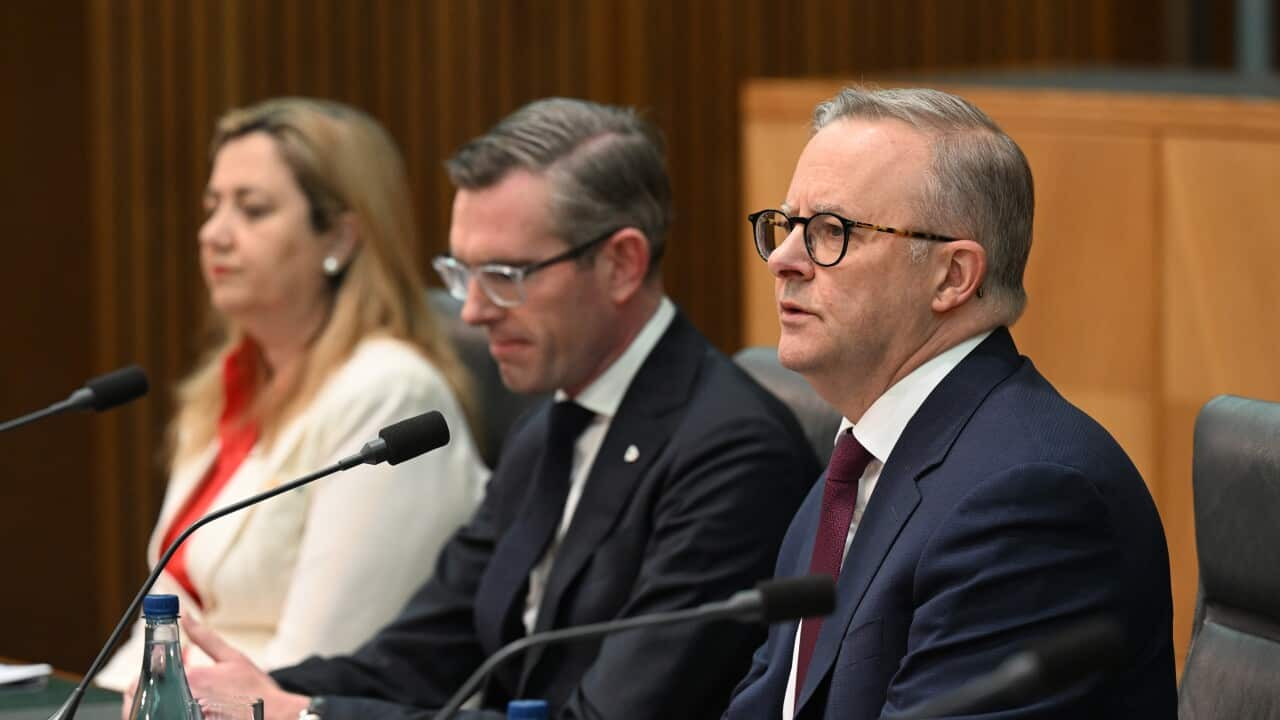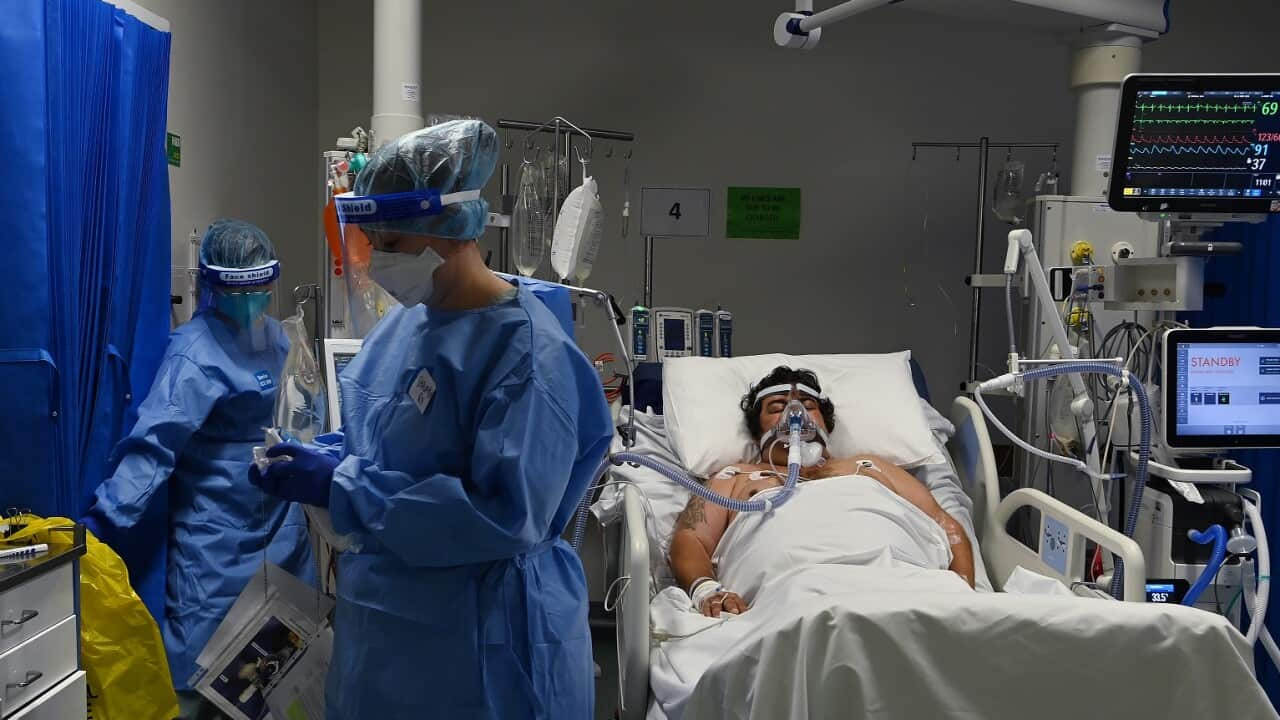Key Points
- COVID-19 mandatory isolation periods have been scrapped, following a decision by National Cabinet.
- The decision to get rid of the mandatory isolation period will also mean the end of pandemic leave payments for affected workers.
Mandatory isolation periods for COVID-19 have been scrapped, following a decision by National Cabinet.
Prime Minister Anthony Albanese and state and territory leaders agreed people with COVID-19 will no longer be subject to a five-day stay-at-home order, following Friday's meeting at Parliament House.
The changes will come into effect from 14 October.
The isolation period, however, will still apply to employees in vulnerable settings such as hospital workers and those in aged care.
The decision to get rid of the mandatory isolation period will also mean the end of pandemic leave payments for affected workers, with the payments also ending from 14 October.
The payments that remain for workers in vulnerable settings would be split 50-50 between the Commonwealth and the states and territories.
Mr Albanese said the measures would be proportionate and would target the most vulnerable.
"We want a policy that promotes resilience and capacity-building and reduces a reliance on government intervention," he told reporters in Canberra.
"It was a unanimous decision by the national cabinet today and had the support of all premiers and chief ministers."
Australia's Chief Medical Officer Paul Kelly said while case numbers were low and isolation requirement was easing, the pandemic was not over.

Chief Medical Officer Professor Paul Kelly. Source: AAP
"We will almost certainly see future peaks of the virus into the future, as we have seen earlier in this year," he said.
"It is a time, though, now to consider that we have other things that we can do to protect those most vulnerable people, and that is absolutely our key aim."
Professor Kelly said the removal of isolation measures was a reasonable course of action.
"It is time to move away from COVID exceptionalism, in my view, and think about what we should do to protect people from any respiratory disease," he said.
"We can't look at isolation by itself. We need to look at those measures and the protections we have as well as other protections. It is important that we keep an option for a change to these settings in the future."
PM defends decision to end pandemic leave payments
The prime minister defended the decision to end the pandemic leave payments, saying it was the right time for the change.
He said state and territory leaders supported the decision.
"It isn't sustainable for government to pay people's wages forever," he said.
"It was always envisaged that these measures were emergency measures that were put in place.
"The flu has existed, and health issues have existed, for a long period of time, and the government hasn't always stepped in to pay people's wages while people have health concerns."

State and federal leaders hold a press conference following a meeting of National Cabinet at Parliament House in Canberra, 30 September 2022. Source: AAP / MICK TSIKAS/AAPIMAGE
Some state and territory leaders, including NSW Premier Dominic Perrottet, had urged ahead of National Cabinet for an end to mandatory isolation period, with Mr Perrottet saying Australians needed to take personal responsibility for their actions.
Doctors express concerns over end to COVID-19 isolation
The president of the Australian Medical Association Steve Robson earlier on Friday strongly criticised leaders who had advocated for a scrapping of isolation measures.
"People who are pushing for the isolation periods to be cut are not scientifically literate and are putting the public at risk, and they need to understand that," he told the ABC.
"We're seeing a huge upswing in the numbers of COVID cases again. It's coming into holiday season when people would be travelling around the world.
"It's a period of significant risk and we're urging caution because we need to protect the health system."
Victorian Chief Health Officer Professor Brett Sutton tweeted: "Sleepwalking into COVID is not a strategy I would recommend. Still much remains uncertain".

Victoria’s Chief Health Officer Professor Brett Sutton. Source: AAP / Joel Carrett
"Haven't they seen the situation in the UK? The NHS is in desperate strife and case numbers in the UK are starting to go up again," Professor Esterman tweeted.
Hospitalisations in the United Kingdom have begun to rise again with experts suggesting they are about to experience a fourth wave of COVID infections.
However, Sydney University Professor Emeritus of Epidemiology Robert Cumming tweeted it was time to abolish the isolation measures.
"Case numbers continue to fall and we are going into summer. If we don’t drop mandatory isolation now, when will we? People should still be encouraged to stay home if they have respiratory symptoms - we need to make this easy for everyone to do," Professor Cumming wrote.
Meanwhile, defence force support for the country's aged care sector for COVID-19 is coming to an end.

Defence Minister Richard Marles. Source: AAP / JAMES ROSS/AAPIMAGE
"We have left no stone unturned tackling the pandemic and supporting the aged care sector throughout this winter," Ms Wells said.
Mr Marles, who is also the deputy prime minister, said the Australian Defence Forces' resources had to be used for other priority areas.
The armed forces were brought in at the start of the pandemic as a surge workforce to help manage outbreaks in aged care homes.
"We need to get to the point where we move away from public health orders," he said.
"It's always a balance between the public health, broader health issues like mental health, social wellbeing and economic and financial issues facing people across our state."
Mr Albanese had consistently said national consensus was needed for any changes, as happened .
Asked about a reported push by the states for more public hospital funding, Health Minister Mark Butler said the federal government had already extended pandemic support, which is due to expire on Friday.
This involved allocating an extra $760 million to the state hospital system until the end of the year.
Ms Wells said the government has since boosted the workforce's surge capacity, driven up vaccination rates and lifted the supply of anti-viral medications.
"This has been and continues to be an incredibly difficult time for older Australians, their families and carers, and for the workers and providers of aged care," Ms Wells said.
It comes after the Therapeutic Goods Administration granted provisional approval for a Pfizer COVID-19 booster for children aged between six months and five years.
The medical regulator last week also provided provisional approval to .
The latest weekly COVID-19 data will also be released by states and territories on Friday.
There were almost 45,000 infections recorded last week, with more than 200 deaths.


